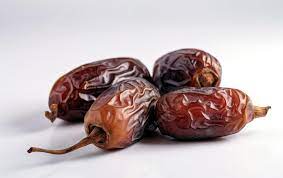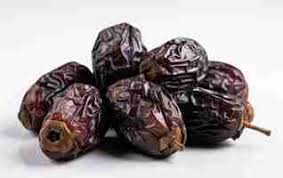A date is a type of fruit that grows on the date palm tree, scientifically known as Phoenix dactylifera. Dates are a popular and nutritious fruit consumed worldwide. Dates are small, oval-shaped fruits with a length typically ranging from 1 to 2 inches (2.5 to 5 cm). They have a wrinkled, brownish-black outer skin, which can vary in color depending on the variety and ripeness.
The flesh of a date is soft and chewy when ripe. It surrounds a long, slender pit or stone, which is not edible. Dates have a sweet and caramel-like flavor, often described as a mix of honey, caramel, and brown sugar. The taste can vary depending on the variety and ripeness, with some dates being sweeter than others.
There are numerous varieties of dates, each with its own unique flavor, texture, and appearance. Some popular varieties include Medjool, Deglet Noor, Barhi, and Zahidi, among others. Dates are rich in essential nutrients, making them a healthy snack choice. They are a good source of dietary fiber, vitamins (especially B vitamins like B6 and niacin), minerals (such as potassium, magnesium, and iron), and natural sugars (mainly glucose, fructose, and sucrose). They are also free from cholesterol and low in fat.
Dates are used in various culinary applications. They can be consumed fresh or dried and are often used as a natural sweetener in desserts, smoothies, energy bars, and baked goods. In Middle Eastern and North African cuisines, dates are commonly stuffed with nuts, cheese, or other ingredients. Date paste is also used as a sweet filling in pastries. Due to their nutrient content, dates offer several potential health benefits. They may support digestive health, provide an energy boost, help regulate blood sugar levels, and contribute to overall well-being when consumed as part of a balanced diet.
Dates have cultural and religious significance in many parts of the world. They are often associated with hospitality and are a traditional food offered to guests in Middle Eastern and North African cultures. Dates are also mentioned in various religious texts, including the Quran, where they are considered a blessed and nutritious fruit.
Dates are a delicious and nutritious fruit with a sweet, caramel-like flavor, enjoyed for their taste and health benefits. They have a rich history and play a significant role in various culinary traditions and cultures around the world.
The Economic Importance and Uses of Dates Drupe

Dates are a type of fruit that comes from the date palm tree (Phoenix dactylifera). They are considered a drupe, which is a type of fruit with a hard pit or seed surrounded by a fleshy fruit. Dates have several economic importance and uses:
1. Food Source: Dates are primarily grown for their fruit, which is consumed as a food source. They are rich in carbohydrates, fiber, essential minerals (such as potassium, magnesium, and iron), and vitamins (such as B vitamins and vitamin K). Dates are often eaten as a snack or used in various culinary applications.
2. Exports: Many countries with suitable climates, such as Iran, Saudi Arabia, Egypt, and the United Arab Emirates, cultivate date palms and export dates. The export of dates contributes significantly to the economies of these regions.
3. Food Industry: Dates are widely used in the food industry as ingredients in various products. They can be found in energy bars, baked goods, candies, and even as a natural sweetener in products like date syrup and date sugar.
4. Date Products: The processing of dates into various products like date paste, date syrup, and date sugar adds value to the fruit. These products are used in baking, confectionery, and as sweeteners in a variety of dishes and beverages.
5. Alcoholic Beverages: In some regions, dates are used to make alcoholic beverages like date wine or date brandy. These beverages have cultural and economic significance in certain areas.
Read Also: Dates Stamen: Economic Importance, Uses and By-Products
6. Medicine: Date fruit and other parts of the date palm tree, such as the leaves and seeds, have been used in traditional medicine for their potential health benefits. For example, date palm pollen has been studied for its antioxidant and anti-inflammatory properties.
7. Livestock Feed: Date palm by-products, including date pits and leaves, can be used as livestock feed. This provides an additional source of income for date farmers and reduces waste.
8. Date Palm Trees: The date palm tree itself is of economic importance beyond its fruit. It is used for landscaping and ornamental purposes in many regions and can be a source of shade and shelter.
9. Date Farming and Employment: Date cultivation and processing provide employment opportunities for people in many regions, particularly in areas where date palms are a major crop.
10. Tourism: In regions where date palm cultivation is a significant part of the landscape and culture, such as oases in desert regions, date farms and date-related festivals can attract tourists, boosting local economies.
11. Traditional Crafts: Date palm leaves are used for weaving various products such as baskets, mats, and hats. These crafts can be sold as souvenirs or used locally.
12. Environmental Benefits: Date palm trees play a role in environmental conservation by stabilizing soil, preventing desertification, and providing habitat for wildlife.
The Products and By-products That Can Be Derived From Dates Drupe
Dates are a type of fruit known as a drupe, and they offer a range of products and by-products due to their versatility.
Here are some of the primary products and by-products that can be derived from dates:
1. Fresh Dates: These are the whole, unprocessed fruits harvested directly from date palm trees. They can be consumed as a sweet and nutritious snack.
2. Dried Dates: Dates are often dried to extend their shelf life. They become a concentrated source of natural sweetness and are commonly used in baking, snacking, and as an ingredient in various dishes.
3. Date Paste: Date paste is made by blending softened dates into a smooth, sweet paste. It’s used as a natural sweetener in recipes, such as desserts, smoothies, and dressings.
4. Date Syrup: Date syrup is a thick, sweet liquid made by boiling dates in water and then straining the mixture. It serves as a natural alternative to refined sugar or maple syrup in various recipes.
5. Date Sugar: Date sugar is made from dehydrated and ground dates. It can be used as a substitute for refined sugar in baking and cooking.
6. Date Juice: Date juice or date nectar is extracted from fresh dates and can be used as a sweetener or as a base for beverages.
7. Date Vinegar: Date vinegar is produced by fermenting date juice or date syrup. It can be used in salad dressings, marinades, and as a condiment.
8. Date Seed Oil: Date seeds can be cold-pressed to extract date seed oil. This oil is rich in antioxidants and can be used in cooking and skincare products.
9. Date Pits/Powder: Date pits can be ground into a fine powder. This powder can be used as an exfoliating agent in skincare products or as an additive in animal feed.
10. Date Bran: The outer layers of dates, known as bran, can be used in animal feed, compost, or as a source of dietary fiber in human food products.
11. Date Molasses: Date molasses is a by-product of date juice production. It’s thicker and darker than date syrup and is used as a sweetener and flavoring in Middle Eastern cuisine.
12. Date Wine: In some regions, dates are fermented to produce date wine or date palm wine. This alcoholic beverage is popular in certain cultures.
13. Date-based Snacks: Various snacks, such as date bars, energy balls, and date-filled cookies, are made using dates as a primary ingredient.
14. Date-based Cosmetics: Date extracts, date seed oil, and other date-derived ingredients can be used in cosmetics and skincare products due to their moisturizing and antioxidant properties.
15. Date-based Medicines: Dates have been used in traditional medicine for their potential health benefits. Date extracts and powders may be used in dietary supplements and herbal remedies.
In conclusion, dates and date palms have a wide range of economic importance and uses, ranging from being a valuable food source to contributing to various industries and local economies. Their cultural and historical significance in many regions also adds to their overall importance.
Read Also: How to Get Started with Sugar Cane Minecraft

